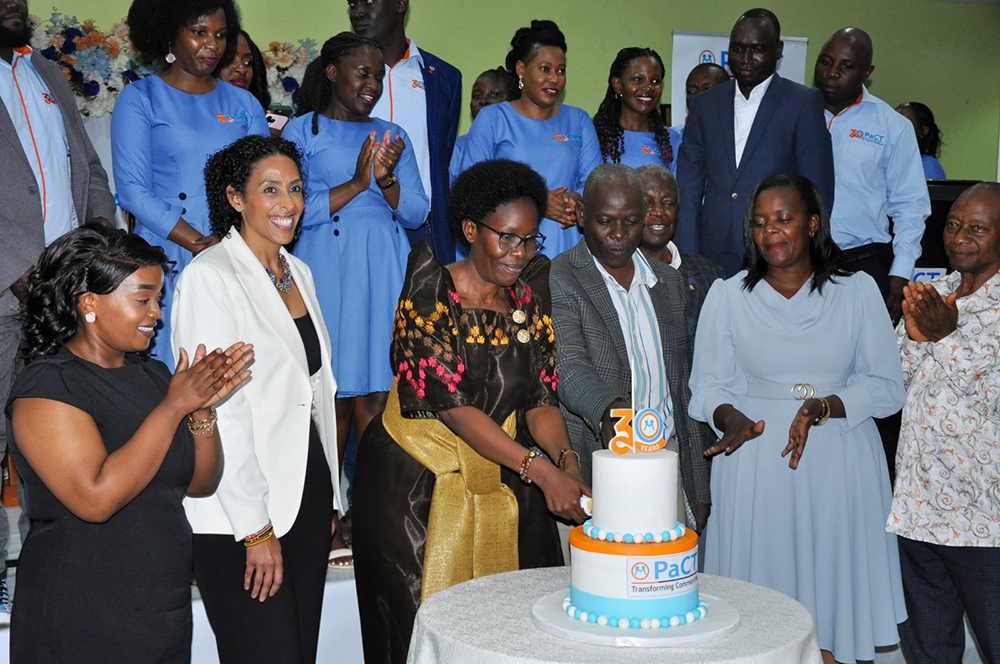Many bibanja holders lack documents—Nabakooba
She made the remarks during the commemoration of 30 years of Partners for Community Transformation (PaCT), which has impacted the lives of local communities, especially in greater Mubende and some parts of Bunyoro
Lands minister Judith Nabakooba hold a framed picture celebrating 30 years of Partners for Community Transformation (PaCT), which has impacted the lives of local communities. (Courtesy photo)
__________________
Lands minister Judith Nabakooba has said many people who own bibanja (plots of land) across the country lack documents.
She made the remarks during the commemoration of 30 years of Partners for Community Transformation (PaCT), which has impacted the lives of local communities, especially in greater Mubende and some parts of Bunyoro, at Imperial Royale Hotel in Kampala on July 25, 2025.
“In Uganda, many people have bibanja, but they lack documents showing ownership and boundaries. They just say this is where we were born, or it was given to us by our parents,” Nabakooba said.
Lands minister Judith Nabakooba receving an award during the commemoration of 30 years of Partners for Community Transformation (PaCT). (Courtesy photo)
She commended PaCT for its significant contribution towards strengthening land tenure security and empowering lives in Uganda.
PaCT is an international development organisation operating in nearly 40 countries.
The minister noted that since its inception, over 30,000 plots of land have been mapped and free certificates of occupancy issued to owners.
This exercise is pioneered by PaCT in collaboration with partners such as the German Corporation for International Cooperation (GIZ), with support from the European Union.
Nabakooba disclosed that the greater Mubende sub-region has taken a lion’s share from this programme, with mapping of bibanja in eight sub-counties in Mityana, Gomba, and Mubende. Other beneficiaries are in Kassanda and Kiboga.
“The certificates of occupancy are one of the major solutions to solving land conflicts between tenants and landlords,” she added, noting that they can also be used as collateral to access credit in financial institutions.
She noted that transforming communities and empowering them to live better is in line with Uganda’s socio-economic transformation.
Greater Mubende is one of the areas still grappling with several challenges, including limited access to clean water and inadequate education and health infrastructure.

Lands minister Judith Nabakooba cutting cake while other look on and others clap during the commemoration of 30 years of Partners for Community Transformation (PaCT). (Courtesy photo)
The minister appreciated the returns of PaCT’s initiative, highlighting that at least six maternity wards have been constructed in the sub-region, three of which are located in Mityana District, in Mityana Municipality, Kalangaalo, and Kikandwa sub-counties.
“They have equally supported the government initiative of easing access to clean water. At least over 300 water points have been constructed, 100 of which are in Mityana, and support over 500 children through education sponsorship programmes and constructed toilet facilities in more than 30 schools along with essential school infrastructures, including classroom blocks,” Nabakooba said.
Geoffrey Ssemakula, the executive director of PaCT, said they first identified areas with critical issues arising from insecurities on land, thus focusing on greater Mubende first before rolling out to the rest of the country.
In Gomba district, he noted, they have improved the relationship between landlords and tenants, with at least 400 certificates of occupancy being given out to locals, and these have since changed people’s lives.
He launched the 30th signature project, the construction of a new classroom block at Sserunyonyi Primary School in Kalangaalo subcounty.
“We are working to ensure at least in two years, we have changed the lives of vulnerable children who are still grappling with a shortage of classrooms. We found that some children are studying under the trees and others share classrooms,” he said.
Hope Grania Nakazibwe, Woman MP for Mubende, applauded the organisation for extending clean water to local communities in her area.
She disclosed that Mubende is one of the districts which had low water coverage, especially in areas like Kiyuni and Kibalinga sub-counties, but currently over 50 boreholes have been drilled in those areas.

Geoffrey Kinaalwa Ssemakula, the executive director for PaCT, said they are currently operating in seven districts of Mityana, Mubende, Kiboga, Gomba, Kassanda, Kakumiro, among others.
He said they chose Sserunyonyi Primary School because of its vulnerability, with some children still having classrooms under the trees and others sharing classrooms.
“We are going to work with our stakeholders to facelift the school structures. In two years, we expect it to be complete.”